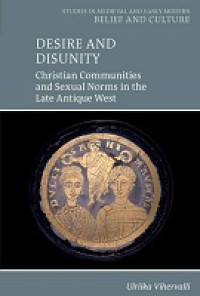
Text
E-book Desire and Disunity: Christian Communities and Sexual Norms in the Late Antique West
Penilaian
0,0
dari 5Desire and Disunity explores the struggles of Christianising late ancient sexuality in the late Roman West. Through an examination of fourth to sixth century sermons, letters, laws, and treatises in Latin-speaking communities, the difficulties of late antique clerics in moving ascetically influenced sexual ideals into wider practice become evident. Western clerics faced challenges on several fronts: the dedication and devoutness of lay Christians varied, while the military-political upheavals of the fifth century created new challenges and opportunities for influencing one’s flock. Furthermore, Roman sexual norms continued to inform the thinking of many clerics and lay figures alike, even when in opposition to more scripturally based moral reasoning. Problems of bigamy, concubinage, sex work, incest, homosexual acts, adultery, and more troubled western Christian communities, with contradicting rules and traditions on what was acceptable and what was not. What reach did elite clerical perspectives on sexual norms have amongst the non-elite? How did clerics navigate tensions between the idealisation of Christian communal purity and the actions of congregants that fell short of these ideals? What influenced clerical perceptions of sex and how did they articulate these ideas to their audiences? Clerical sources of this time reflect these challenges as well as varying church attempts to reform the sex lives of their congregants – and, indeed, church failure in doing so.
Ketersediaan
Informasi Detail
- Judul Seri
-
-
- No. Panggil
-
909.07 VIH d 002822-eB-0122
- Penerbit
- : Liverpool University Press., 2024
- Deskripsi Fisik
-
248 halaman
- Bahasa
-
English
- ISBN/ISSN
-
9781835530023
- Klasifikasi
-
909.07
- Tipe Isi
-
text
- Tipe Media
-
computer
- Tipe Pembawa
-
online resource
- Edisi
-
-
- Subjek
- Info Detail Spesifik
-
-
- Pernyataan Tanggungjawab
-
Vihervalli, Ulriika
Versi lain/terkait
Tidak tersedia versi lain
Lampiran Berkas
Komentar
Anda harus masuk sebelum memberikan komentar
 Karya Umum
Karya Umum  Filsafat
Filsafat  Agama
Agama  Ilmu-ilmu Sosial
Ilmu-ilmu Sosial  Bahasa
Bahasa  Ilmu-ilmu Murni
Ilmu-ilmu Murni  Ilmu-ilmu Terapan
Ilmu-ilmu Terapan  Kesenian, Hiburan, dan Olahraga
Kesenian, Hiburan, dan Olahraga  Kesusastraan
Kesusastraan  Geografi dan Sejarah
Geografi dan Sejarah